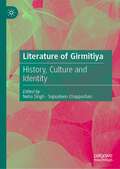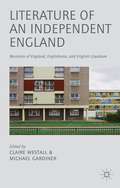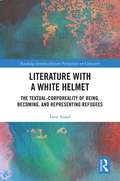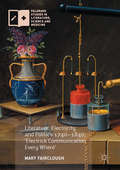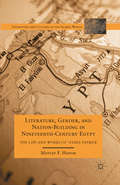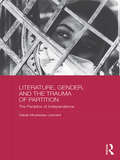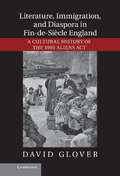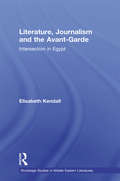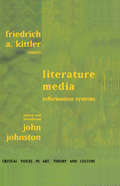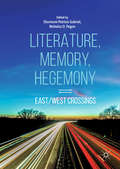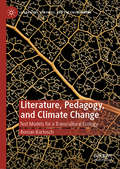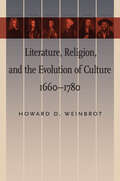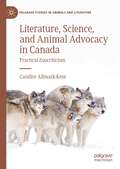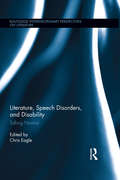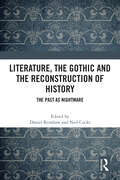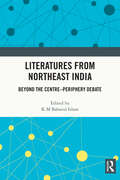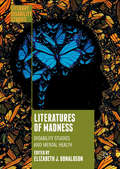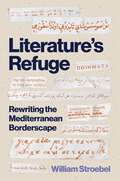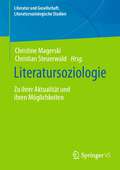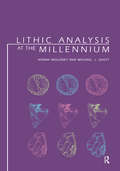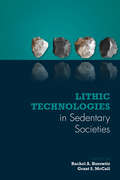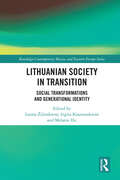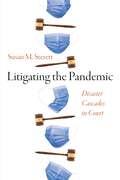- Table View
- List View
Literature of Girmitiya: History, Culture and Identity
by Neha Singh Sajaudeen ChapparbanThis book covers various forms of the production of girmitiya culture and literature. One of the main objectives is to conceptualize the idea of girmitya, girmitology, and girmitiya literature, culture, history, and identity in both colonial and postcolonial contexts. This book aims to document the history, experiences, culture, assimilation, and identity of girmitiya community. It also critically analyses the articulation, projection, and production of their experiences of migration and being immigrant, their narratives, tradition, culture, religion, and memory. It also explores how this labour community formulated into a diaspora community and reconnected/created the home (land) and continues to do so in the wake of globalization and Information and Communication Technology (ICT). This book is an attempt to bring the intriguing neglected diverse historical heritage of colonial labour migration and their narratives into the mainstream scholarly debates and discussions in the humanities and the social sciences through the trans- and interdisciplinary perspectives. This book assesses the routes of migration of old diaspora, and it explains the nuances of cultural change among the generations. Although, they have migrated centuries back, absorbed and assimilated, and got citizenships of respective countries of destinations but still their longing for roots, culture, identities, “home”, and the constant struggle is to retain connections with their homeland depicted in their cultural practices, arts, music, songs, folklore and literary manifestations.
Literature of an Independent England
by Michael Gardiner Claire WestallSome of the most incisive writers on the subject rethink the relationship between Britain, England and English literary culture. It is premised on the importance of devolution, the uncertainty of the British union, the place of English Literature within the union, and the need for England to become a self-determining literary nation.
Literature with A White Helmet: The Textual-Corporeality of Being, Becoming, and Representing Refugees (Routledge Interdisciplinary Perspectives on Literature)
by Lava AsaadLiterature with A White Helmet explores issues of refugee writers, contemporary works of fiction and nonfiction on the refugee’s body and experience, the biopolitics of refugees, and disputes over the ethicality of representing refugees by writers and human rights activists. The book relies on a broad selection of texts by authors who, in one way or another, have experienced displacement, witnessed it, imagined it, or co-written about it.
Literature, Electricity and Politics 1740–1840: ‘Electrick Communication Every Where’ (Palgrave Studies in Literature, Science and Medicine)
by Mary FaircloughThis book investigates the science of electricity in the long eighteenth century and its textual life in literary and political writings. Electricity was celebrated as a symbol of enlightened progress, but its operation and its utility were unsettlingly obscure. As a result, debates about the nature of electricity dovetailed with discussions of the relation between body and soul, the nature of sexual attraction, the properties of revolutionary communication and the mysteries of vitality. This study explores the complex textual manifestations of electricity between 1740 and 1840, in which commentators describe it both as a material force and as a purely figurative one. The book analyses attempts by both elite and popular practitioners of electricity to elucidate the mysteries of electricity, and traces the figurative uses of electrical language in the works of writers including Mary Robinson, Edmund Burke, Erasmus Darwin, John Thelwall, Mary Shelley and Richard Carlile.
Literature, Gender, and Nation-Building in Nineteenth-Century Egypt
by Mervat F. HatemThis book examines how the process of nation-building in Egypt helped transform Egypt from an Ottoman province to an Arabic speaking national community. Through the discussion of the life and works of the prominent writer `A'isha Taymur, Hatem gives insight into how literature and the changing gender roles of women and men contributed to the definition and/or development of a sense of community.
Literature, Gender, and the Trauma of Partition: The Paradox of Independence (Routledge Research on Gender in Asia Series)
by Debali Mookerjea-LeonardPartition occurring simultaneously with British decolonization of the Indian subcontinent led to the formation of independent India and Pakistan. While the political and communal aspects of the Partition have received some attention, its enormous personal and psychological costs have been mostly glossed over, particularly when it comes to the splitting of Bengal. The memory of this historical ordeal has been preserved in literary archives, and these archives are still being excavated. This book examines neglected narratives of the Partition of India in 1947 to study the traces left by this foundational trauma on the national- and regional-cultural imaginaries in India, Pakistan, and Bangladesh. To arrive at a more complex understanding of how Partition experiences of violence, migration, and displacement shaped postcolonial societies and subjectivities in South Asia, the author analyses, through novels and short stories, multiple cartographies of disorientation and anxiety in the post-Partition period. The book illuminates how contingencies of political geography cut across personal and collective histories, and how these intersections are variously marked and mediated by literature. Examining works composed in Bengali and other South Asian languages, this book seeks to broaden and complicate existing conceptions of what constitutes the Partition literary archive. A valuable addition to the growing field of Partition studies, this book will be of interest to scholars of South Asian history, gender studies, and literature.
Literature, Immigration, and Diaspora in Fin-De-SièCle England
by David GloverThe 1905 Aliens Act was the first modern law to restrict immigration to British shores. In this book, David Glover asks how it was possible for Britain, a nation that had prided itself on offering asylum to refugees, to pass such legislation. Tracing the ways that the legal notion of the 'alien' became a national-racist epithet indistinguishable from the figure of 'the Jew', Glover argues that the literary and popular entertainments of fin de siècle Britain perpetuated a culture of xenophobia. Reconstructing the complex socio-political field known as 'the alien question', Glover examines the work of George Eliot, Israel Zangwill, Rudyard Kipling and Joseph Conrad, together with forgotten writers like Margaret Harkness, Edgar Wallace and James Blyth. By linking them to the beliefs and ideologies that circulated via newspapers, periodicals, political meetings, Royal Commissions, patriotic melodramas and social surveys, Glover sheds new light on dilemmas about nationality, borders and citizenship.
Literature, Journalism and the Avant-Garde: Intersection in Egypt (Routledge Studies in Middle Eastern Literatures)
by Elisabeth KendallThe author explores the role of journalism in Egypt in effecting and promoting the development of modern Arabic literature from its inception in the mid-nineteenth century to the present day. Remapping the literary scene in Egypt over recent decades, Kendall focuses on the independent, frequently dissident, journals that were the real hotbed of innovative literary activity and which made a lasting impact by propelling Arabic literature into the post-modern era.
Literature, Media, Information Systems
by Friedrich A. KittlerJohn Johnston's background combines expertise in modern literature, poststructuralist philosophy, and high technology's production. Like Kittler, he draws on historic fact, anecdote, and literature. From this vantage point he explicates the theoretical and practical consequences of Friedrich Kittler's insights into the social and psychological effects of the processes by which metaphor in one medium is made real by another.
Literature, Memory, Hegemony: East/West Crossings
by Nicholas O. Pagan Sharmani Patricia GabrielThis edited book considers the need for the continued dismantling of conceptual and cultural hegemonies of ‘East’ and ‘West’ in the humanities and social sciences. Cutting across a wide range of literature, film and art from different contexts and ages, this collection seeks out the interpenetrating dynamic between both terms. Highlighting the inherent instability of East and West as oppositional categories, it focuses on the ‘crossings’ between East and West and this nexus as a highly-charged arena of encounter and collision. Drawing from varied literary contexts ranging from Victorian literature to Chinese literature and modern European literature, the book covers a diverse range of subject matter, including material drawn from psychoanalytic and postcolonial theory and studies related to race, religion, diaspora, and gender, and investigates topical social and political issues —including terrorism, nationalism, citizenship, the refugee crisis, xenophobia and otherness. Offering a framework to consider the salient questions of cultural, ideological and geographical change in our societies, this book is a key read for those working within world literary studies.
Literature, Pedagogy, and Climate Change: Text Models for a Transcultural Ecology (Literatures, Cultures, and the Environment)
by Roman BartoschLiterature, Pedagogy, and Climate Change: Text Models for a Transcultural Ecology asks two questions: How do we read (in) the Anthropocene? And what can reading teach us? To answer these questions, the book develops a concept of transcultural ecology that understands fiction and interpretation as text models that help address the various and incommensurable scales inherent to climate change. Focussing on text composition, reception, storyworlds, and narrative framing in world literature and elsewhere, each chapter elaborates on central educational objectives through the close reading of texts by Chimamanda Ngozi Adichie, Teju Cole and J.M. Coetzee as well as films, picture books and new digital media and their aesthetic affordances. At the end of each chapter, these objectives are summarised in sections on the ‘general implications for studying and teaching’ (GIST) and together offer a new concept of transcultural competence in conversation with current debates in literature pedagogy and educational philosophy.
Literature, Religion, and the Evolution of Culture, 1660–1780
by Howard D. WeinbrotA distinguished critic traces the growing, but always threatened, trend toward political and religious tolerance from the mid-seventeenth to the late eighteenth century in Britain.Winner of the CHOICE Outstanding Academic Title of the Choice ACRLLiterature, Religion, and the Evolution of Culture, 1660–1780 chronicles changes in contentious politics and religion and their varied representations in British letters from the mid-seventeenth to the late eighteenth century. An uncertain trend toward tolerance and away from painful discord significantly influenced authors who reflected on and enhanced germane aspects of British literary and intellectual life. The movement was stymied during the painful Gordon Riots in June 1780, from which Britain needed to repair itself.Howard D. Weinbrot's broad-ranging interdisciplinary study considers sermons, satire, political and religious polemic, Anglo-French relations, biblical and theological commentary, Methodism, legal history, and the novel. Literature, Religion, and the Evolution of Culture, 1660–1780 analyzes the texts and contexts of several major and minor authors, including Daniel Defoe, Charles Dickens, Olaudah Equiano, Maria De Fleury, Lord George Gordon, Nathaniel Lancaster, Henry Sacheverell, Tobias Smollett, and Edward Synge.
Literature, Science, and Animal Advocacy in Canada: Practical Zoocriticism (Palgrave Studies in Animals and Literature)
by Candice Allmark-KentLiterature, Science, and Animal Advocacy in Canada: Practical Zoocriticism is the first book-length study of animals in Canadian literature. Using a historical approach, it offers a much-needed alternative to existing models of animals as symbols of Canadian victimhood. Spanning more than a century, the scope of this book includes classic writers, Ernest Thompson Seton and Charles G. D. Roberts, as well as popular contemporary authors, such as Barbara Gowdy, Yann Martel, Margaret Atwood, and many others. By recontextualizing these works with closer attention to contemporary scientific and animal advocacy debates, this book offers a fresh new perspective on a wide range of texts.
Literature, Speech Disorders, and Disability: Talking Normal (Routledge Interdisciplinary Perspectives on Literature)
by Chris EagleExamining representations of speech disorders in works of literature, this first collection of its kind founds a new multidisciplinary subfield related but not limited to the emerging fields of disability studies and medical humanities. The scope is wide-ranging both in terms of national literatures and historical periods considered, engaging with theoretical discussions in poststructuralism, disability studies, cultural studies, new historicism, gender studies, sociolinguistics, trauma studies, and medical humanities. The book’s main focus is on the development of an awareness of speech pathology in the literary imaginary from the late-eighteenth century to the present, studying the novel, drama, epic poetry, lyric poetry, autobiography and autopathography, and clinical case studies and guidebooks on speech therapy. The volume addresses a growing interest, both in popular culture and the humanities, regarding the portrayal of conditions such as stuttering, aphasia and mutism, along with the status of the self in relation to those conditions. Since speech pathologies are neither illnesses nor outwardly physical disabilities, critical studies of their representation have tended to occupy a liminal position in relation to other discourses such as literary and cultural theory, and even disability studies. One of the primary aims of this collection is to address this marginalization, and to position a cultural criticism of speech pathology within literary studies.
Literature, the Gothic and the Reconstruction of History: The Past as Nightmare
by Neil Cocks Daniel Renshaw AndIn the Gothic, nothing stays buried for long. Since its inception in the mid-eighteenth century, the Gothic imagination has been concerned with the pasts of the societies from which it emerged. This collection, featuring contributions from archivists, historians and literary critics, examines how horror fiction and the wider Gothic mode have engaged with the constructed conception of "history".From Victorian nightmares of Jurassic jungles to ghost stories on the contemporary stage, the contributors adopt varied and innovative approaches to consider how the Gothic has created, complicated and sometimes subverted historical narratives. In doing so, these works blur the distinctions between the "historical record" and creative endeavour, undermine linear and sequential understandings of the progress of time and dissolve temporal boundaries. The collection explores a variety of Gothic forms including drama, poetry, prose, illustration, film and folklore, and it draws on classic texts such as Wuthering Heights and Dracula, as well as less familiar works, including Reynolds’ The Mysteries of London and Baldini’s Mal’aria.Literature, the Gothic and the Reconstruction of History will be invaluable to students and scholars interested in the confluences of literary and historical endeavour, the creation and depiction of historical constructs in popular culture, and Gothic horror in its myriad forms.
Literatures from Northeast India: Beyond the Centre–Periphery Debate
by K M Baharul IslamThis book showcases the diverse literary traditions from India’s Northeast and their shared connections and lineages. It critically analyses a selection of literary works from authors and poets from this region and the hegemonies of language, ethnicity and politics that have framed these voices. A region with rich cultural and ethnolinguistic diversity, the literature from Northeast India is representative of varied histories, languages, socio-cultural and religious practices. The book highlights the distinct use of language, forms, cultural symbols and metaphors which articulates the unique experiences of conflict, beauty and culture in this area. Focussing on the translingual and transcultural aspects of these literary works it examines the dynamics between literature, language and their socio-cultural influences. The book pays attention to themes of representation, identity and power to showcase voices and perspectives of dissent, criticism and introspection. It explores contemporary critical approaches to literature from the Northeast, by re-examining the idea of the centre and the periphery and the position of subaltern literary voices. This book will be of interest to students and researchers of literature, language, cultural studies, postcolonial studies and South Asian studies.
Literatures of Madness: Disability Studies and Mental Health (Literary Disability Studies)
by Elizabeth J. DonaldsonLiteratures of Madness: Disability Studies and Mental Health brings together scholars working in disability studies, mad studies, feminist theory, Indigenous studies, postcolonial theory, Jewish literature, queer studies, American studies, trauma studies, and comics to create an intersectional community of scholarship in literary disability studies of mental health. The collection contains essays on canonical authors and lesser known and sometimes forgotten writers, including Sylvia Plath, Louisa May Alcott, Hannah Weiner, Mary Jane Ward, Michelle Cliff, Lee Maracle, Joanne Greenberg, Ann Bannon, Jerry Pinto, Persimmon Blackbridge, and others. The volume addresses the under-representation of madness and psychiatric disability in the field of disability studies, which traditionally focuses on physical disability, and explores the controversies and the common ground among disability studies, anti-psychiatric discourses, mad studies, graphic medicine, and health/medical humanities.
Literature’s Refuge: Rewriting the Mediterranean Borderscape
by William StroebelStories silenced or sequestered by a century of mass displacement between Europe and the Middle East—recovered and retold at lastIn 1923, the Greco-Turkish Population Exchange uprooted and swapped nearly two million Christians and Muslims, &“pacifying&” the so-called Near East through ethnic partition and refugeehood. This imposition of borders not only uprooted peoples from their place in the world; it also displaced many of their stories from a place in world literature. In Literature&’s Refuge, William Stroebel recovers and weaves together work by fugitive writers, oral storytellers, readers, copyists, editors, and translators dispersed by this massive &“unmixing&” of populations and the broader border logic that it set in motion. Stroebel argues that two complementary forces emerged as a template for the Eastern Mediterranean&’s cultural landscape: the modern border, which reshuffled people through a system of filters and checkpoints; and modern philology, which similarly reshuffled their words and works. Philologists and publishers defined modern literature by picking apart, extracting, reformatting, or dispossessing refugee and diasporic texts across a racialized borderscape—a gray zone of semi-inclusion and semi-exclusion, semimobility and immobility.Stroebel reaches into the chinks and crannies of this borderscape to reconstitute the rich textual geography between Greek Orthodoxy and Sunni Islam, between Greek-script, Arabic-script, and Latin-script literary traditions at the edges of Europe and the Middle East. Doing so, he offers a new methodological toolkit for rewriting the modern borderscapes of world literature.
Literatursoziologie: Zu ihrer Aktualität und ihren Möglichkeiten (Literatur und Gesellschaft. Literatursoziologische Studien)
by Christine Magerski Christian SteuerwaldDas Buch eröffnet die Reihe „Literatur und Gesellschaft“ und bietet mit seinen literatursoziologischen Studien einen vertieften Einblick in die aktuellen Themen und Paradigmen der deutschsprachigen Literatursoziologie. Die Beiträge reichen von der kritischen Lektüre fiktionaler, semifiktionaler und theoretischer Texten über die Erprobung neuer Perspektivierungen aus den Kultur-, Medien- und Kommunikationswissenschaften einschließlich der Digital Humanities bis hin zu ersten Entwürfen einer Soziologie der literarischen Bewertung und des Schauspiels sowie einer Literatursoziologie der technischen Existenzweise.
Lithic Analysis at the Millennium (UCL Institute of Archaeology Publications)
by Norah Moloney Michael J. ShottThe original research papers in the volume provide a broad review of current approaches to the study of lithic technology from the Palaeolithic to the present. The contributions address both with analytical techniques and interpretive issues. Collectively, they increase our understanding of issues such as tool function, means of production, raw material sourcing and exchange systems, and the evolution of human cognition, social organization and symbolic behavior.
Lithic Technological Systems and Evolutionary Theory
by Nathan Goodale William Andrefsky Jr.Stone tool analysis relies on a strong background in analytical and methodological techniques. However, lithic technological analysis has not been well integrated with a theoretically-informed approach to understanding how humans procured, made, and used stone tools. Evolutionary theory has great potential to fill this gap. This collection of essays brings together several different evolutionary perspectives to demonstrate how lithic technological systems are a byproduct of human behavior. The essays cover a range of topics, including human behavioral ecology, cultural transmission, phylogenetic analysis, risk management, macroevolution, dual inheritance theory, cladistics, central place foraging, costly signaling, selection, drift, and various applications of evolutionary ecology.
Lithic Technologies in Sedentary Societies
by Grant S. McCall John Whittaker Fumi Arakawa Mary A. Davis James Enloe Dan Healan Francesca Manclossi Theodore Marks Jayur Madhusudan Mehta Jason S. R. Paling Steve RosenLithic Technologies in SedentarySocieties examines lithic technology from ancient societies in Mesoamerica, the Near East, South Asia, and North America, showcasing the important contributions in-depth lithic analysis can make to the study of sedentary societies around the world. Using cutting-edge analytical techniques these case studies address difficult anthropological questions concerning economic, social, and political issues, as well as global trends in lithic production. Lithic analysis focused on sedentary societies, especially in places like Mesoamerica, has previously been neglected mostly because of the high frequency of informal tools, but such bias limits the ways in which both lithic production and economic organization are investigated. Bringing the importance of studying such technologies to the fore and emphasizing the vital anthropological questions that lithics can answer, Lithic Technologies in Sedentary Societies is a valuable resource for scholars and students of lithic technology and sedentary, complex societies. Contributors: Fumi Arakawa, Mary A. Davis, James Enloe, Dan Healan, Francesca Manclossi, Theodore Marks, Jayur Madhusudan Mehta, Jason S. R. Paling, Steve Rosen, John Whittaker
Lithics: Macroscopic Approaches to Analysis
by Jr William AndrefskyThis fully updated and revised edition of William Andrefsky Jr's ground-breaking manual on lithic analysis is designed for students and professional archaeologists. It explains the fundamental principles of the measurement, recording and analysis of stone tools and stone tool production debris. Introducing the reader to lithic raw materials, classification, terminology and key concepts, the volume comprehensively explores methods and techniques, presenting detailed case studies of lithic analysis from around the world. It also examines new emerging techniques and includes a new section on stone tool functional studies.
Lithuanian Society in Transition: Social Transformations and Generational Identity (Routledge Studies in the History of Russia and Eastern Europe)
by Melanie Ilic Laima Žilinskienė Sigita KraniauskienėLithuanian Society in Transition examines the life experiences formed during the process of post-socialist transformation in Lithuania by analysing the peculiarities of the life course of the cohort of young people born between 1980 and 2000. This book considers how various different components of post-Soviet system transformation and more recent events, such as the COVID-19 pandemic, determine youth experiences and how these experiences are reflected in the generations born between 1980 and 2000. It explores how far these generations see themselves as distinct generations with distinctive identities, how far any sense of a distinctive identity is based on political criteria or on technological changes, demography, and lifestyle and how far recent geopolitical events have had an impact on the identities of these younger generations. Drawing on detailed evidence from a corpus of specially commissioned life history interviews, the individual chapters uncover self-reflexive generational identities and set these in the broader context of both specific local generational identities and more global generation identifiers. Offering a rich analysis on social change in a key post-Soviet country following the collapse of communism, this book will be useful for researchers in sociology and social policy, history, Russia and Former Soviet Union, European studies and ethnic studies.
Litigating the Pandemic: Disaster Cascades in Court (Critical Studies in Risk and Disaster)
by Susan M. SterettAs officials scrambled in 2020 to manage the spread of COVID, the reverberations of the crisis reached well beyond immediate public health concerns. The governance problems that emerged in the pandemic would be problems in other climate-related disasters, too.Many of these governance problems wound up in court. Businesses filed insurance claims for lost commerce; when the claims were denied, some companies sued. Defense attorneys tried to get inmates released from prison, citing dangerous living conditions. As state governments ordered closures and otherwise tried to adapt, interest organizations that had long sought to limit government authority challenged them in court. Political officials railed against litigation they argued would stop businesses from reopening. The United States, like other countries, governs partly through litigation, and litigation is one way of seeing the multiple governance failures during the pandemic.Drawing on databases of cases filed, news reports, and the websites of advocacy groups and law firms, Susan M. Sterett argues that governing during the pandemic, or in any disaster, must include the human institutions intertwined with the effects of the virus. Those institutions reveal problems well beyond the reach of technical expertise. Failures in private insurance as a way of governing risk, conflicts about the primacy of religion, government authority, and health, are problems that predated the pandemic and will persist in future disasters.
